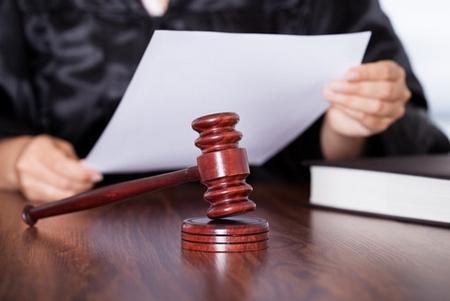Recent Blog Posts
Can I Modify My Divorce Decree?
 After your divorce was finalized, you probably felt a huge amount of relief. The road to a final divorce decree can be long and difficult. The terms of your divorce seemed fair at the time, but now things have changed. It could be that your children’s needs are different, or that your ability to provide for them has changed. People’s personal situations can change drastically after a divorce, making the terms in the divorce order no longer fair or reasonable.
After your divorce was finalized, you probably felt a huge amount of relief. The road to a final divorce decree can be long and difficult. The terms of your divorce seemed fair at the time, but now things have changed. It could be that your children’s needs are different, or that your ability to provide for them has changed. People’s personal situations can change drastically after a divorce, making the terms in the divorce order no longer fair or reasonable.
In certain situations, it may be possible to modify an existing divorce decree to reflect a change in circumstances. However, seeking a modification to a divorce decree can be complicated. You will need to work with an attorney who understands the grounds for modification and the process of seeking one.
When Can I Get a Divorce Modification?
Courts are often reluctant to modify an existing divorce decree. Once a divorce is finalized, you will need to prove that you have a very good reason to change the terms. Generally, this means that you will need to show the court that you have experienced a “substantial change in circumstances.” This requirement is likely to be met in situations like:
Safely Seeking Divorce From an Abusive Marriage
 No one deserves to be abused by their spouse. No matter what has happened between you and your spouse, there is never any excuse for your spouse to abuse you. Spousal abuse can take many forms. While domestic violence is the classic form of abuse, there are other ways one spouse might abuse the other. Financial abuse, where one spouse controls all the assets to keep the other dependent is also common. Psychological or emotional abuse can be just as damaging as physical violence. Excessive control is also abuse. For example, if your spouse does not “let you” do things like seeing your friends or forces you to live by their rules, that is also abuse.
No one deserves to be abused by their spouse. No matter what has happened between you and your spouse, there is never any excuse for your spouse to abuse you. Spousal abuse can take many forms. While domestic violence is the classic form of abuse, there are other ways one spouse might abuse the other. Financial abuse, where one spouse controls all the assets to keep the other dependent is also common. Psychological or emotional abuse can be just as damaging as physical violence. Excessive control is also abuse. For example, if your spouse does not “let you” do things like seeing your friends or forces you to live by their rules, that is also abuse.
Seeking a divorce from an abusive marriage takes a lot of courage. Leaving an abusive marriage is not without risks, however. If you need help getting out of an abusive marriage, Mevorah & Giglio Law Offices will do everything in our power to keep you protected during this time.
4 Common Reasons U.S. Visa Applications Get Denied
 Learning that the U.S. visa you or your loved one in another country applied for has been denied can be frustrating. For some, it can even be frightening. You may have an idea of why you were denied, or you may have been blindsided by the denial. Even if your initial application for a visa was denied, there may be steps an attorney can help you take to ultimately get approved.
Learning that the U.S. visa you or your loved one in another country applied for has been denied can be frustrating. For some, it can even be frightening. You may have an idea of why you were denied, or you may have been blindsided by the denial. Even if your initial application for a visa was denied, there may be steps an attorney can help you take to ultimately get approved.
It is important to understand the reason for your denial in order to potentially overcome any issues and get a visa. What your next steps could look like may depend on the reason for your denial and whether it is temporary or permanent in addition to whether it is waivable. An immigration attorney can help you better understand why you or your loved one was denied and what to do next.
What Are Some Common Reasons U.S. Visa Applicants Get Denied?
There are a few very common reasons that U.S. visa applications are not accepted. Yours is more likely than not among them. Some are temporary and can be overcome. These reasons for denial include:
Was Your Truck Accident Caused by an Intoxicated Driver?
 Driving an 18-wheeler takes focus and skill. It is critical that truck drivers are completely sober when working. Drugs and alcohol can impair the driver’s focus and coordination, making it impossible for them to safely drive a large vehicle. Substance use among truck drivers is more common than you might hope. The job can be demanding. Truck drivers are away from home for weeks at a time and often work long, monotonous, hours. Some resort to using substances to cope. Stimulants are a popular choice, as drivers may believe that they will help, rather than hurt, their driving ability. It is, of course, illegal for a truck driver to operate their rig while impaired. If you suspect that an impaired truck driver caused your accident, it is particularly important that you contact an attorney within a day or so of the accident and alert them of your suspicions.
Driving an 18-wheeler takes focus and skill. It is critical that truck drivers are completely sober when working. Drugs and alcohol can impair the driver’s focus and coordination, making it impossible for them to safely drive a large vehicle. Substance use among truck drivers is more common than you might hope. The job can be demanding. Truck drivers are away from home for weeks at a time and often work long, monotonous, hours. Some resort to using substances to cope. Stimulants are a popular choice, as drivers may believe that they will help, rather than hurt, their driving ability. It is, of course, illegal for a truck driver to operate their rig while impaired. If you suspect that an impaired truck driver caused your accident, it is particularly important that you contact an attorney within a day or so of the accident and alert them of your suspicions.
Will the Truck Driver Be Drug or Alcohol Tested?
How Can I Recover Damages After a Hit-and-Run?
 Getting hurt in a car accident is going to cause a serious disruption to your life no matter what. The process of recovering damages can be annoying even when the at-fault driver stops and exchanges insurance information. However, if the driver who hit you took off without stopping, you may be wondering who on earth is going to pay for all your damages.
Getting hurt in a car accident is going to cause a serious disruption to your life no matter what. The process of recovering damages can be annoying even when the at-fault driver stops and exchanges insurance information. However, if the driver who hit you took off without stopping, you may be wondering who on earth is going to pay for all your damages.
The good news is that there are multiple ways to recover compensation after a hit-and-run crash. You may be able to pursue compensation from more than one party. A lot will depend on the circumstances of your accident, your own insurance policy, and whether it is possible to identify the driver who caused the crash. You should strongly consider getting an attorney who can help you determine the best course of action, as recovering compensation after a hit-and-run can be complex.
Ways to Recover Compensation Following a Hit-and-Run
One of the difficulties associated with pursuing a hit-and-run claim is proving what happened. When there are two damaged vehicles stopped, the police can usually determine what happened fairly easily. When only one damaged vehicle is stopped, it can be difficult to prove that the crash was in fact caused by another driver.
Proving Negligence After a Truck Accident
 Accidents caused by a negligent truck driver can be devastating. Personal vehicles offer little protection to their occupants during a collision with a much larger commercial truck. If you were hit by a careless semi-truck driver, odds are your injuries are fairly severe. You are likely to require intensive medical care after such an accident, and you may have missed a great deal of work. Settlements or awards related to truck accidents tend to be on the higher end. Unfortunately, this often means that truck drivers and the companies they work for will probably try very hard to avoid paying you the compensation you need and deserve. This makes objective evidence showing what actually happened during your truck accident extremely important. Multiple types of evidence may be needed to support your case.
Accidents caused by a negligent truck driver can be devastating. Personal vehicles offer little protection to their occupants during a collision with a much larger commercial truck. If you were hit by a careless semi-truck driver, odds are your injuries are fairly severe. You are likely to require intensive medical care after such an accident, and you may have missed a great deal of work. Settlements or awards related to truck accidents tend to be on the higher end. Unfortunately, this often means that truck drivers and the companies they work for will probably try very hard to avoid paying you the compensation you need and deserve. This makes objective evidence showing what actually happened during your truck accident extremely important. Multiple types of evidence may be needed to support your case.
The attorneys at Mevorah & Giglio Law Offices are skilled at conducting complete investigations to gather evidence of a truck driver’s negligence after a crash. The sooner you call us, the better we can help you.
How to Help a Loved One in ICE Detention
 When you have a family member or dear friend who is undocumented, finding out that they have been taken into ICE custody can be terrifying. Trying to get someone out of an ICE detention center is nothing at all like trying to bail someone out of the county jail after a run-of-the-mill arrest. Helping an undocumented immigrant who is in ICE custody can be complicated. It is a much more involved process than posting bail. Finding a way to help your loved one remain in the country legally can require a lot of effort. The process may be long and complex. In many cases, you will need to enlist an experienced immigration attorney to help get your loved one out of ICE detention. Any legal mistakes could be deeply problematic, so you should avoid trying to do this without skilled legal assistance.
When you have a family member or dear friend who is undocumented, finding out that they have been taken into ICE custody can be terrifying. Trying to get someone out of an ICE detention center is nothing at all like trying to bail someone out of the county jail after a run-of-the-mill arrest. Helping an undocumented immigrant who is in ICE custody can be complicated. It is a much more involved process than posting bail. Finding a way to help your loved one remain in the country legally can require a lot of effort. The process may be long and complex. In many cases, you will need to enlist an experienced immigration attorney to help get your loved one out of ICE detention. Any legal mistakes could be deeply problematic, so you should avoid trying to do this without skilled legal assistance.
Steps to Take When Your Loved One is in ICE Custody
Helping someone who has been taken into custody by immigration enforcement can be an exercise in patience. COVID-related backlogs may mean that it takes quite some time before you can make meaningful progress towards rescuing your loved one. Steps that may help include:
Who Should Not Pursue Alternative Divorce Methods?
 Most spouses going through a divorce are able to avoid costly and time-consuming litigation through the use of methods like mediation, attorney-facilitated negotiation, or collaborative divorce. Alternative dispute resolution tends to work very well when the divorce is amicable, but it can also work for spouses who are not getting along. It is possible for spouses to settle their divorce out of court without even needing to be in the same room. These alternative routes to divorce have become popular because they can speed up the divorce process, save both parties money, and lessen the impact of any conflict for children of the marriage. However, there are times when these types of methods simply do not work. If you have any concerns about whether litigation might be necessary in your case, let your attorney know so they can plan accordingly.
Most spouses going through a divorce are able to avoid costly and time-consuming litigation through the use of methods like mediation, attorney-facilitated negotiation, or collaborative divorce. Alternative dispute resolution tends to work very well when the divorce is amicable, but it can also work for spouses who are not getting along. It is possible for spouses to settle their divorce out of court without even needing to be in the same room. These alternative routes to divorce have become popular because they can speed up the divorce process, save both parties money, and lessen the impact of any conflict for children of the marriage. However, there are times when these types of methods simply do not work. If you have any concerns about whether litigation might be necessary in your case, let your attorney know so they can plan accordingly.
3 Reasons Alternative Divorce Might Not Work for You
A lot of people are initially leery about whether an alternative path to divorce will work for them. These methods require both spouses to participate in good faith. You will need to consider whether your spouse is truly the type of person who cannot be reasoned with, or whether you are simply in conflict with them at this time. Even if there are a lot of hurt feelings involved, mediation or negotiation may still be workable options. However, your attorney may suggest that you not even attempt these methods in cases like:
Immigrant Children With Legal Status May Still Face Deportation
 People from other countries have multiple different avenues for immigrating to the United States. However, the immigration process can be long and complex, and even if a person follows all of the correct procedures, they and their families may face issues that affect their legal status and their ability to stay in the United States. While many lawmakers and immigration officials have recognized that immigrant children who have grown up in the U.S. deserve protections that will allow them to avoid deportation, the options for many of these “dreamers” are limited. People in these situations can consult with an experienced immigration attorney to determine the steps they can take to continue living in the United States.
People from other countries have multiple different avenues for immigrating to the United States. However, the immigration process can be long and complex, and even if a person follows all of the correct procedures, they and their families may face issues that affect their legal status and their ability to stay in the United States. While many lawmakers and immigration officials have recognized that immigrant children who have grown up in the U.S. deserve protections that will allow them to avoid deportation, the options for many of these “dreamers” are limited. People in these situations can consult with an experienced immigration attorney to determine the steps they can take to continue living in the United States.
Problems Facing “Documented Dreamers”
There are many situations where immigrants come to the United States as children, and when this is the only country they have ever known, forcing them to leave the U.S. and resettle elsewhere may cause extreme hardship for them and their families. Congress has attempted to address this issue through the proposed Development, Relief, and Education for Alien Minors (DREAM) Act, which would provide qualifying minors with a path to citizenship. While the DREAM Act has not been passed, other programs, such as Deferred Action for Childhood Arrivals (DACA), have attempted to address this issue.
Should I Pursue a Collaborative Divorce?
 Divorce is never a walk in the park. However, it does not have to be the dramatic legal battle depicted in television and movies either. Alternative resolution methods offer couples the option of ending the marriage amicably, without the need for traditional litigation. If your divorce case is complex, but you and your spouse want to end your marriage cooperatively, collaborative divorce may be your best option.
Divorce is never a walk in the park. However, it does not have to be the dramatic legal battle depicted in television and movies either. Alternative resolution methods offer couples the option of ending the marriage amicably, without the need for traditional litigation. If your divorce case is complex, but you and your spouse want to end your marriage cooperatively, collaborative divorce may be your best option.
The Basics of Divorce Using Collaborative Law
Collaborative divorce is a process through which a divorcing couple works together to resolve divorce issues, including property and debt division, child custody, and spousal maintenance. The spouses do not work against each other, but instead, negotiate divorce issues to reach mutually-agreeable solutions. Each spouse is represented by an attorney who provides legal guidance and advocates on behalf of his or her client during the collaborative process.
 English,
English,
 Spanish,
Spanish,
 Polish,
Polish,
 Urdu
Urdu












 Make a Payment
Make a Payment



